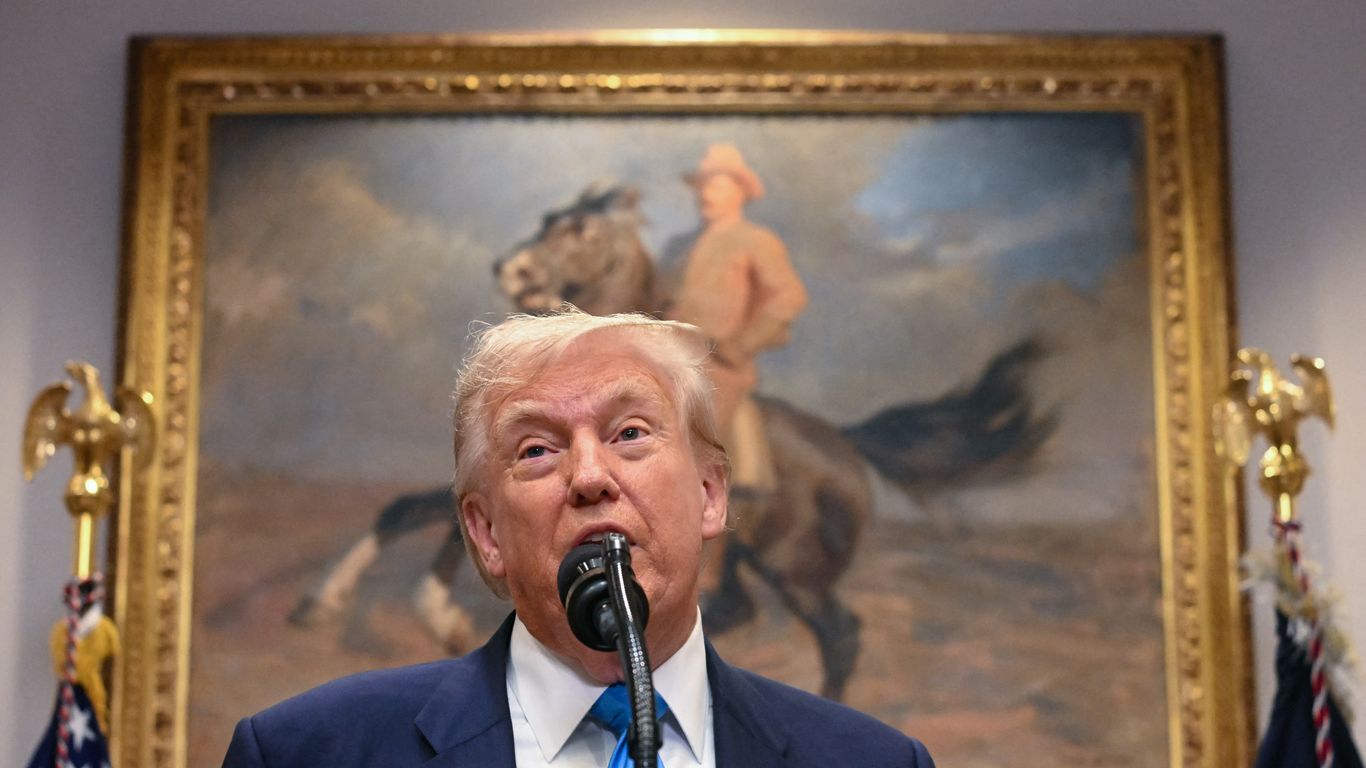Trump's Tariffs on Furniture and Home Goods: Impact and Key Details

Introduction
In a recent post on Twitter, President Trump announced that he will be imposing tariffs on furniture and home goods later this year. This news caused a significant drop in stocks for major furniture companies such as Wayfair, RH, and Williams-Sonoma. This move is a part of the ongoing trade war with China, as Trump aims to bring manufacturing and production back to the United States.
Key Details
The furniture industry has been heavily reliant on imports from China for years, with tariffs on Chinese imports currently at 10%. With the upcoming tariffs, this percentage is expected to increase significantly, affecting the cost and availability of furniture and home goods for consumers. The impact of these tariffs will also be felt by retailers, who will have to adjust their prices and sourcing strategies. Additionally, the increasing tensions between the two countries could lead to further repercussions for the global economy.
Impact
The furniture industry is just one of many sectors that have been affected by the ongoing trade war. With the uncertainty and unpredictability of the situation, it is important for businesses to stay informed and adaptable to potential changes in the market. As for consumers, they may have to pay higher prices for furniture and home goods, as well as face potential delays in delivery due to disruptions in the supply chain. Only time will tell how these tariffs will ultimately impact the industry and its stakeholders.
About the People Mentioned
Donald Trump
Donald John Trump, born June 14, 1946, in Queens, New York, is an American businessman, media personality, and politician. He graduated from the University of Pennsylvania’s Wharton School in 1968 with a degree in economics. In 1971, he took over his family’s real estate business, renaming it the Trump Organization, through which he expanded into building and managing skyscrapers, hotels, casinos, and golf courses. Trump gained widespread fame as the host of the reality TV show *The Apprentice* from 2004 to 2015, which helped establish his public persona as a successful entrepreneur. Trump entered politics as a Republican and was elected the 45th president of the United States, serving from 2017 to 2021. His presidency was marked by significant policy actions including tax cuts, deregulation, the appointment of three Supreme Court justices, renegotiation of trade agreements (notably replacing NAFTA with the USMCA), and a focus on immigration control including border wall expansion. He withdrew the U.S. from international agreements such as the Paris Climate Accord and the Iran nuclear deal, and engaged in a trade war with China. His administration’s response to the COVID-19 pandemic was criticized for downplaying the virus’s severity. Trump was impeached twice by the House of Representatives—first in 2019 for abuse of power and obstruction, and again in 2021 for incitement of insurrection—but was acquitted by the Senate both times. After losing the 2020 election to Joe Biden, Trump challenged the results, culminating in the January 6, 2021, Capitol riot. He remains a central figure in American politics, having won the 2024 presidential election and returned as the 47th president in 2025, continuing to promote policies aimed at economic growth, border security, and military strength[1][2][3][4].
About the Organizations Mentioned
Wayfair
## Overview of Wayfair Wayfair is a leading American e-commerce company specializing in furniture and home goods. Founded in 2002 by Niraj Shah and Steve Conine, it initially operated as CSN Stores, focusing on home entertainment and storage furniture through a drop-shipping model. Over time, CSN expanded to over 200 niche websites before consolidating them into a single platform, Wayfair, in 2011. This strategic move aimed to create a one-stop shop for customers seeking home furnishings and décor[1][2]. ## History and Evolution Wayfair's transformation from a collection of niche sites to a unified brand was pivotal. The company went public in 2014 and has since grown significantly, offering over 18 million products from more than 11,000 suppliers. This vast product range positions Wayfair as a major player in the home goods market, often referred to as the "Amazon of home goods"[1][2]. Historically, Wayfair's sales have shown notable growth, with a nearly 20% increase in the first quarter of 2020 compared to the previous year[1]. ## Key Achievements - **Diversified Product Range**: Wayfair's success lies in its ability to offer a wide variety of products, catering to diverse customer preferences and budgets[7]. - **Multisided Platform**: The company operates as a multisided platform, connecting customers with suppliers while providing a seamless shopping experience[4][5]. - **Innovative Logistics**: Wayfair invests in a proprietary logistics network to enhance delivery times and customer satisfaction[6]. ## Current Status Currently, Wayfair operates with annual sales exceeding $10 billion and has expanded its brand portfolio to include Joss & Main, AllModern, Birch Lane, and Perigold[1][2]. Despite its growth, the company continues to focus on achieving profitability, balancing significant sales with substantial advertising expenses[1][2]. ## Notable Aspects - **
RH
## Overview of RH RH (formerly Restoration Hardware) is an upscale American home-furnishings company headquartered in Corte Madera, California, operating in the luxury lifestyle market[1][4]. The company curates and sells high-end furniture, lighting, textiles, décor, and more through an integrated ecosystem of retail galleries, catalogs, and online platforms[4][6]. RH distinguishes itself with immersive, large-format Design Galleries that serve as experiential showrooms, often located in landmark buildings, and has expanded into hospitality with RH Guesthouses and Restaurants, extending its brand beyond traditional retail[2][6]. ## History and Evolution RH was founded in 1979 as Restoration Hardware by Stephen Gordon in Eureka, California, after he struggled to find authentic period hardware for his Victorian home[2][3]. The company began as a niche retailer of historical reproductions but gradually transformed under the leadership of Gary Friedman, who joined in 2001 and spearheaded a strategic shift toward luxury and lifestyle branding[2][3]. RH went public in 1998, was taken private in 2008 by private equity firms, and returned to the public markets in 2012, rebranding as RH in 2017 to reflect its broader ambitions[2][3]. Key milestones include the launch of the RH Members Program in 2016, which introduced a $175 annual membership for exclusive access and services, and the expansion into contemporary product lines and hospitality in recent years[2]. The company’s evolution from a hardware store to a global arbiter of taste in home furnishings is a testament to its adaptability and vision[6]. ## Key Achievements and Current Status RH’s financials are robust, with revenues of $3.18 billion and profits of $72 million for the fiscal year ended January 2025, and a market value of approximately $4.36 billion as of March 2025[1]. The company employs over 6
Williams-Sonoma
## Williams-Sonoma: A Legacy of Quality and Innovation Williams-Sonoma, Inc., is a leading American retailer specializing in high-quality home furnishings and cookware. Founded in 1956 by Chuck Williams, the company began as a small cookware shop in Sonoma, California, focusing on French kitchenware that was rare in the United States at the time[4][6]. This initial venture marked the beginning of a culinary revolution, with Chuck Williams' store becoming a destination for culinary icons like Julia Child and James Beard after relocating to San Francisco in 1958[4]. ### History and Expansion In 1972, Williams-Sonoma, Inc., was formally established as a corporation, and the company launched its first mail-order catalog, expanding its reach beyond local markets[3][5]. The 1980s saw significant growth, including the acquisition of Pottery Barn from The Gap in 1986, which added a furniture component to the brand[1][3]. The company went public in 1983 and was listed on the New York Stock Exchange (NYSE) in 1998[1][3]. The launch of e-commerce sites in the late 1990s further accelerated its growth[3]. ### Key Achievements and Current Status Today, Williams-Sonoma, Inc., operates a diverse portfolio of brands, including Williams Sonoma, Pottery Barn, West Elm, and Rejuvenation, among others[7]. The company is recognized for its commitment to quality and customer service. It has expanded to over 625 brick-and-mortar stores and distributes products to more than 60 countries[7]. Notably, Williams-Sonoma, Inc., was named a Fortune 500 company for the first time in 2019, marking a significant milestone in its history[1]. ### Notable Aspects - **Innovation and Quality**: Williams-Sonoma is renowned for its high-quality products and innovative designs, which have












